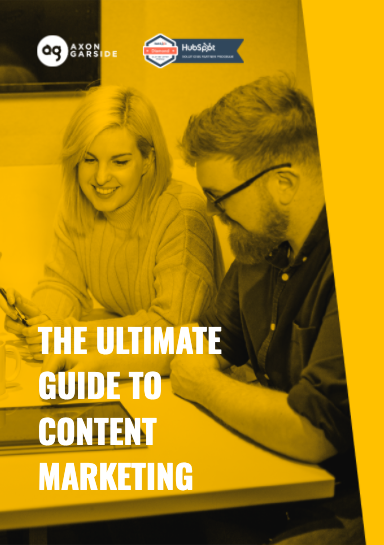Google’s Helpful Content Update: How it Impacts Your Content Strategy
What is Google’s Helpful Content Update? Our experts share actionable steps to align your content strategy with this important update.

Google recently announced that they will be rolling out a new update for the Helpful Content System in the coming months. This update aims to assist Google’s search engine bots to identify content that is deemed ‘Helpful’ and is written from a personal or expert point of view.
Here, we take a look at Google's Helpful Content System in a little more detail and we share how this new update will impact your overall B2B content strategy. Plus, we outline steps you can take to make your content come in line with this important update.
Explaining Google’s Helpful Content System
The Google Helpful Content system, also referred to as the Google Helpful Content Update, was initially rolled out in mid-2022. The main aim of this update was to identify content as either ‘Helpful’ or ‘Unhelpful’.
If most of your content is classed as ‘Helpful’ by Google, then your website stands a really good chance of being ranked higher on the search engine results. On the other hand, if most of your content is classed as ‘Unhelpful’, then your website will rank much lower on the search engine results. This will, of course, affect web traffic, lead generation and your revenue!
In addition, this update aims to prioritise websites that provide people-first content and follow SEO best practices.
According to Google, people-first content centres around answering questions and sharing your personal expertise on a subject matter that you know inside-out. It is not about creating content for search engines.
As for implementing best SEO practices, it is less about populating your content with keywords, but more about ensuring your web presence is fast, secure and accessible to your audience.
What is ‘Helpful’ Content?
Based on Google’s official helpful content update guidelines, ‘Helpful’ content (i.e. people-first content) is:
- Specific to an industry or niche
- Practical and encourages people to take action
- Relevant and up-to-date
- Relatable and draws on personal experiences
In return, Google deems content which is generic, abstract and impersonal in nature as ‘Unhelpful’.
In our recent guide for B2B content marketing, we cover how to write effective B2B content and provide examples of content format that you can provide.
How This Update Impacts Your Content Strategy?
You might think that your website or blog is packed with loads of useful content that delivers actionable steps and insights to your audience. But does it really?
Not to cast any doubt about your content, but it is important to emphasise how this update, when it first rolled out in August 2022, created a false sense of confidence amongst the most experienced digital marketers.
It wasn’t just the so-called “worst offenders”, as Neil Patel put it, that were affected. The update had also affected websites belonging to the biggest names in the digital marketing industry.
Websites like Moz, Search Engine Journal, Backlinko and even HubSpot’s blog collectively saw between 8 to 12% drop in website traffic for total keywords. When you factor how these websites attract thousands of visitors a week, that’s a huge dip.
So yes, if the Helpful Content System can affect the biggest names of the digital marketing space, then it will impact your website too. So it is important that you take the right action.
How to Make Your Content ‘Helpful’
Here, we share key steps to help you ensure your content is classed as ‘Helpful’ and aligns with Google's latest update.
Stick To What You Know
While content marketing or inbound marketing helps you to attract web traffic by providing rich information, it is very easy to fall into the trap of creating content about a topic you don’t know inside-out for the sake of getting traffic to your blog and raising awareness of your brand.
The problem here is, when you write about a topic you’re not an expert in, it will really show in your content. Your content will come across as generic and abstract. And with Google’s latest update, it will pick it up and class it as ‘Unhelpful’.
This is why it is easier (and crucial) to stick to what you know, whether that's a specific industry or niche.
TOP TIP: When reviewing your content, identify any content pieces where you feel you don’t fully understand the topic. Consider asking a colleague who knows the topic more and ask them for their input. Saying that, make sure all your content is related to your industry or niche.
Know Your Target Audience
Your content needs to be personal and relatable. To achieve this, you really need to know your target audience. This is where buyer personas come into play.
A buyer persona is a semi-fictional representation that helps you visualise who you are writing for. Most buyer personas are created by reviewing analytics data and speaking with members of your sales, marketing, product and services team to discover which demographic make up the majority of your customers, such as age, sex, location and occupation.
You can also conduct interviews with both current and prospective customers (who are yet to speak to your company’s sales team) to find out what makes them tick and pinpoint their needs and wants.
Once you accumulate as much information as you can, you can then proceed to create a persona.
TOP TIP: When creating your buyer persona, write a story revolving around their key characteristics, goals, strengths and main challenges they face. This will help you and your company remember your personas much easier.
Provide Personal Insight & Actionable Steps
It goes without saying that you should back up whatever you say with relevant statistics or studies. However, with Google’s Helpful Content System, you need to go the extra mile and provide your personal input too.
Google has noticed that it is fairly easy for anyone to create generic content and reference statistics. The search engine’s bot crawls through millions of web pages per day, and they have observed how there are several similar pieces of content citing the same study or statistic.
This is why your content should be unique based on your personal experience and expertise. Yes, back it up with relevant statistics when necessary, but also encourage your reader to take action to help achieve their goal.
TOP TIP: Share your own unique perspective and experiences on your chosen topic. While knowledge is important, the experience you gained working in a specific industry or niche market is extremely helpful to those who are seeking it. Google knows this too.
Remember to Write For Humans, Not For Search Engines
Even though it is important to include relevant keywords within the headers and main body of the text, just remember, you are writing for your target audience.
For this, you may need to break away from old habits of writing content for the sake of getting traffic and ranking high on search engines, and embrace habits that will help you create content that is relatable and engaging.
TOP TIP: To help, always keep your reader in mind. Write as if you are speaking directly to your audience. Writing in second person (i.e. “you”) will allow you to make your writing more personable.
Review or Remove ‘Unhelpful’ Content
And lastly, look out for content that is deemed ‘Unhelpful’ by Google. One way you can identify ‘Unhelpful’ content is through your web analytics.
Since this update has come into play, you will have noticed a number of content pieces that have seen a drop in web traffic and engagement, and it is very likely that these pieces will have been classed as ‘Unhelpful’ by Google.
If any of these content pieces are your hero content, then it is best to set aside some time to review the content so it meets the ‘Helpful’ content criteria.
As for pieces which are not related to your industry or niche, then it might be a good idea to remove the content from your website altogether.
After all, if you have a large amount of content that is deemed ‘Unhelpful’, it will impact your overall search engine ranking.
TOP TIP: When reviewing your content, be sure to share personal insights or experiences to your content where possible. If needed, rewrite the whole piece from your personal perspective.
Remember Your Audience
When conducting or reviewing your content marketing campaign, always keep your audience in mind because you’re creating content for them, and not for search engines.
If you have been doing this from the beginning, then you’re in a strong position, but it is good practice to review your content periodically to ensure your content is relevant and up-to-date.


